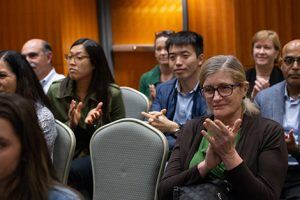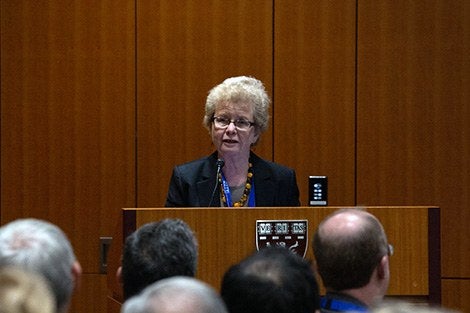October 4, 2018—Colleagues, students, and friends of Marie McCormick, Sumner and Esther Feldberg Professor, emerita, at Harvard T.H. Chan School of Public Health, recently gathered to honor her distinguished career in maternal and child health, highlighting both her “steel spine” as a scholar and leader, and her warm and generous mentorship.
The State of Maternal & Child Health, Children, Youth & Families symposium was held September 27, 2018 at the Joseph B. Martin Conference Center.
McCormick is a pediatrician internationally recognized for her research on the outcomes of high-risk infants, especially preterm infants, and the evaluation of programs to improve their health and development. She became chair of the School’s Department of Maternal and Child Health in 1991, holding the position until the department merged with another to create the Department of Social and Behavioral Sciences. McCormick continued to direct the School’s training program in maternal and child health, a concentration with a current cohort of around 50 students.

In remarks at the symposium, Kathleen Stratton of the National Academy of Sciences highlighted McCormick’s work on several scientific advisory committees—some covering controversial topics. McCormick chaired a high-profile U.S. Institute of Medicine committee that examined claims that childhood immunization with the MMR (measles, mumps, and rubella) vaccine causes autism. The committee found no evidence to support the link and recommended no change in immunization procedures.
She also led a National Academies of Sciences, Engineering, and Medicine committee on the health effects of marijuana and cannabis-derived products. After examining more than 10,000 studies, the committee reported last year that much of the research does not provide clear guidelines regarding populations that could benefit or be harmed by marijuana. Among the strongest findings the committee reported were evidence that marijuana may ease chronic pain and chemotherapy-induced nausea in cancer patients and that it may harm fetal development and cause respiratory problems.
Even in the face of pushback from the public or policymakers—which grew particularly intense around her work on vaccine safety—McCormick handled her work with wisdom, rigor, and integrity, speakers said.
In opening remarks at the symposium, Dean Michelle Williams called McCormick one of her “heroes in public health.” McCormick created an intellectual home for maternal and child health at the School through her leadership, Williams said.
Other speakers included Scott Podolsky, director of Center for the History of Medicine and professor of global health and social medicine, Harvard Medical School, who gave a history of maternal and child health at the School. Michael Lu of George Washington University—a former head of the federal Maternal and Child Health Bureau—spoke about the need to address discrimination and other root causes of ill health in order to improve maternal and infant mortality.
Many at the event noted that McCormick had a gift for mentorship, always taking time out of her busy schedule to speak with students and colleagues about professional and personal concerns.
A highlight of the afternoon was a video comprised of messages for McCormick submitted from colleagues, friends, and former students from around the globe. Participants described her as an inspirational leader, and recounted moments when she had offered them guidance at key moments in their career development.
In her own remarks, McCormick said that she was overwhelmed by the accolades. “I was just doing what I enjoyed,” she said. She ended by telling the audience, “I hope you all go forward and do good things for kids.”
Photos: Nilagia McCoy
